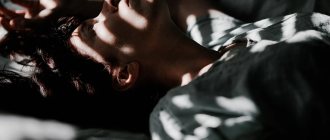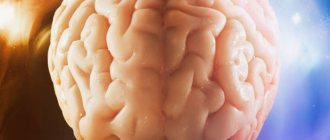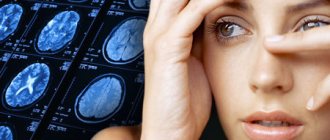A feeling of panic, fear of death, severe fright - all these symptoms that suddenly overwhelm a person while falling asleep at night are characteristic of people with vegetative-vascular dystonia. The stress and negative emotions experienced during the day can form a snowball in the evening, which carries a real threat of a neurotic disorder.
Why do panic attacks happen at night?
At night, we are left alone with our fears. It is easier to escape from worries and unpleasant thoughts during the day than at night. If a person is prone to anxiety and has a number of accumulated problems, or is experiencing stress, then the likelihood of nighttime panic attacks increases.
In this state, our brain is in “defense mode,” constantly monitoring for threats, including any changes it senses in the body. So if you go to bed feeling tense, when your body begins to relax, it may perceive it as something dangerous and trigger a stress response. Panic attacks are your body's way of protecting you.
Possible consequences
Problems with sleep will certainly lead to undesirable consequences for the body.
A person who experiences increased anxiety and a feeling of fear at night cannot fully rest. Without normal sleep, his immunity decreases, chronic diseases worsen, and his susceptibility to viruses and bacteria increases.
A constant feeling of anxiety at night and fear do not allow the body to recover, rest, have a destructive effect on the physical condition of the individual, and also provoke psychological discomfort. Such conditions can lead to the following consequences:
- increase in anxiety and depressive symptoms;
- constant migraines;
- the appearance of problems with the cardiovascular system;
- constant fatigue, weakness, weakness;
- complete decrease in performance;
- progression of temper and irritability;
- neuroses;
- psychical deviations.
Nightmares
Panic attacks that occur during sleep are usually caused by nightmares. Nightmares are considered a form of sleep disorder that affects the nervous system, causing unusual behavior.
Nightmare
Nightmares are episodes of intense fear during sleep, usually occurring in the first third of the night. You may wake up terrified with a frantic intensity of physical symptoms that trigger a panic attack.
Symptoms of an upcoming attack
What happens to a person during an outbreak?
At the first stage, a protective function is activated, by which the body is, as it were, separated from the outside world. This is where the “flight or fight” signal is sent to the brain, releasing increased amounts of adrenaline. The latter, in turn, is regarded by the individual as dangerous.
Common symptoms of the disease include sweating, nausea, trembling, and a feeling of detachment.
But the most obvious sign of a panic attack is uncontrollable fear.
What to do when attacks occur before bed?
As mentioned above, at night we often begin to process all the stresses of the day or worry about the day ahead. Panic attacks before bedtime usually occur during stressful moments in life, when our head is filled with problems. Maybe these are quarrels in relationships, conflicts at work, a period of painful changes.
After we've had a panic attack, worrying about it happening again can create a vicious cycle in which we become afraid to fall asleep. Although this type of reaction is considered normal, it often causes even more concern.
Problems falling asleep
Night attacks of panic and fear, which are constant companions of an anxiety attack, greatly devastate a person, both morally and physically. Having experienced this condition once, a person is afraid of its repetition, which is why he has difficulty falling asleep. Constantly being in such a situation provokes a fear of death or loss of mind in a person.
The life of a patient with VSD is burdened by the following types of problems with falling asleep:
- the inability to fall asleep due to the continuous scrolling of all possible scenarios for the development of events that lie ahead the next day: you need to try to distract yourself, throw all the negativity out of your head and tune in for the best;
- difficulties falling asleep in a new place: you can solve this problem by imagining yourself in a cozy home bed, you can take your usual clothes for sleeping with you, and before going to bed, follow all the usual rituals.
What to do if you have a panic attack at night
If you are having a panic attack, experts advise taking the following steps:
- Close your eyes and inhale slowly and deeply through your nose.
- Then exhale slowly and deeply through your mouth.
- If you can, continue this process as long as it lasts, counting 1 - 5 on each inhalation and exhalation.
Try to accept that you are experiencing a panic attack without any resistance. When we try to fight anxiety, we only make it worse. It can be scary, but try to move towards the anxiety rather than away from it.
Panic attack
Once you feel better, the worst is over. Just remember – your body is on high alert right now, so it will likely take some time to calm down again. So sleep is out of the question for a while.
Causes
The main sources of panic attacks during sleep are not fully understood. But the basis for such violations is failures in the functioning of biologically active substances. This category includes norepinephrine and gamma-aminobutyric acid.
Heredity is the main factor in the development of the disease, which occurs in 15% of cases.
Therefore, if relatives have problems in this area, one should not exclude such a disease in children.
A psychotherapist and a somnologist are involved in diagnosing and treating symptoms of panic in a dream.
Tips on what to do after an attack
- Go to the bathroom and splash some cold water on your face. The cold causes a shock in the system, which prompts the body to go into survival mode, ultimately lowering the heart rate.
- Then try to find a simple activity that will calm you down. Wash the dishes, sweep the floor, clean out the refrigerator. Whatever you choose, do it in such a boring and mundane way that it requires minimal mental effort. Remember, you are not trying to distract yourself here, you are just doing normal, run-of-the-mill activities while your symptoms begin to subside.
- If you wake up sweaty, take a warm shower, put new sheets on your bed, and put on your comfiest pajamas. Having removed the physical evidence of a panic attack, we will start over and return to sleep as quickly as possible.
- Gradually you will begin to feel your body begin to relax. Return to bed only when you are ready. If it's not time yet, try meditating or taking a few deep breaths until your body begins to calm down again.
Remember the main thing, no matter how terrible panic attacks are, they cannot cause us physical harm.
Learning to fall asleep correctly
Learning to fall asleep correctly is not as easy as it might seem at first glance. If anxious thoughts do not allow a person to fully rest at night, he may develop neurosis-like conditions that will require the use of medications. Most of them have unpleasant side effects, so you should try to solve the problem without using them.
We recommend reading: Features of arrhythmia in VSD
To learn how to fall asleep correctly, you should use one of the methods suggested below:
- Visualization: imagine yourself in a safe, calm place, saying “I am starting to fall asleep in a warm soft bed, nothing threatens me.” Imagine your surroundings as clearly and in detail as possible: a soft blanket, a purring cat, a fire in the fireplace, the smell of fresh baked goods.
- Getting rid of unpleasant thoughts: when you fall asleep, imagine that all your fears have gathered together in a balloon that you are holding by the thread, you can let it go a little and the worries will go further, or you can drop them completely and they will fly away forever.
- Distraction: Having experienced a panic attack once creates a constant expectation of its repetition. To prevent such a situation, you should be distracted before going to bed, devoting this time to your favorite hobby, embroidery, coloring pictures, playing with children.
- To get rid of insomnia caused by the fear of developing panic, you should jot down on paper several unpleasant activities that you will have to take on if you cannot fall asleep. You can even take up their implementation, but under no circumstances should you be distracted by rest or other matters.
- Start self-examination: lie on the bed in a comfortable position and feel your own body, centimeter by centimeter, not only mentally, but also tactilely, looking for and not finding unpleasant or frightening symptoms.
How to stop nighttime panic attacks
Talking to a therapist can help you address the root of your anxiety and find tools to create real, lasting, positive changes in your life. At the same time, performing nightly exercise can help create a nurturing environment for your body to naturally calm down and prepare you for sleep.
- Try talking to your partner, family member or friend about what's bothering you. Take a bath or warm shower before bed. The heat will help relax your muscles and body.
- Keep a pen and paper handy. If you start to worry about things or tasks, write them down (or add them to a list on your phone). Worrying at night when you can't do anything about them is useless. Once you write it down, you can return to it at a more convenient time.
- Eliminate alcohol from your life for a while. While alcohol can temporarily numb our worries, it is also a serious stimulant for anxiety. The same goes for caffeine. Make sure you don't drink tea or coffee after 6pm.
- Be active. Never forget the importance of exercise.
- The next time you're trying to sleep, try taking your mind off the dream and focusing it on your physical sensations instead. Think about how good it feels to be in bed.
- When negative thoughts arise, imagine locking them in a small box and throwing away the key. Remind yourself: now is not the best time to think about it.
- Set yourself a designated “worry time.” It's half an hour of the day where you allow yourself to worry about as many things as you want. When you start worrying outside of these times, remind yourself so you can forget about it until next time.
- If you have trouble falling asleep for a long time, get out of bed and do something until you start to feel sleepy again. Your bed should be your sanctuary for sleep and it is important that you do not start associating it with any anxious, sleepless nights.
- Some people find that certain foods can cause anxiety. The next time you have a panic attack at night, try writing down what you ate before bed. And as soon as you make a list, start removing these products one by one until the panic attacks stop.
If you suffer from panic attacks, then your anxiety level is very high. Please remember: You do not have to go through this alone. Seek support if panic attacks begin to interfere with your ability to enjoy everyday life.
Where does the fear of falling asleep come from?
The disorder is caused by the fear of losing control. When falling asleep, a person loses the ability to control sensations in the body and events around.
The fear of falling asleep comes from ancient times. Primitive people perceived the sleeping period as a danger of being eaten by predators or killed by enemy tribes, and losing property.
In the animal world, large predators have the deepest sleep, since the threat to them from other animals is minimal. The deep phase in carnivorous mammals accounts for 37% of total sleep, and in small rodents it is 3%.
The causes of hypnophobia or, as it is also called, clinophobia, somniphobia, are varied.
- Children's fears, formed under the influence of watching horror films or hearing horror stories. The child's psyche poorly distinguishes the imagined from the real, and has increased suggestibility. Therefore, children often make frightening scenes from films so realistic that fictional horror films accompany the child in his dreams and in reality. As for the horror stories they hear, a rich child’s imagination can very vividly reflect in the minds and frighten children more than what they see. It all depends on children's imagination. Fears acquired in childhood can accompany a person into adulthood if they are not stopped in time.
- Nightmarish dreams that take away a person’s desire to sleep.
- A stressful event experienced while asleep. The man fell out of bed in a sleepy state and was very frightened. Subsequently, he developed a fear of sleep.
- In impressionable people with a developed imagination, a phobia appears after communicating with a hypnophobe. The patient tells the interlocutor about his fears. The suggestible person easily transfers them to himself. At night, the imagination intensifies significantly, giving rise to absurd, frightening fantasies.
- Clinophobia manifests itself as a result of saving time. A person is afraid to fall asleep because he believes that he will waste time, will not have time to cope with important matters, or will lose the opportunity to have fun.
- There are specific causes of clinophobia. For example, the mother of a newborn child is afraid to fall asleep, as she will lose the ability to watch her still helpless baby.
- A common cause of somniphobia is fear of death. This is especially true for people with cardiovascular diseases. The fear of having a stroke or heart attack while sleeping is so strong that a person is afraid to fall asleep. In a sleeping state, people are deprived of the ability to control what is happening. Obviously, it is this fact that provokes the fear that the patient will not be able to feel painful sensations and take the necessary measures, and, as a result of unprovided medical measures, will die in his sleep.
- The fear of being buried alive arises from the fear of falling into lethargic sleep. This state is characterized as deep sleep of a long duration, during which the body supposedly independently supports vital functions, and nothing threatens it. However, the person sleeps so soundly that it is impossible to wake him up. Breathing and heartbeat are so weakly expressed that they are sometimes difficult to detect. As a result, the sleeper is declared dead, which creates a fear of intravital burial. Nikolai Vasilyevich Gogol suffered from a similar phobia.
In his youth, the great writer suffered from malaria, which led to encephalitis. The brain inflammation was cured, but the consequences of the disease remained with the writer for life. Nikolai Vasilyevich periodically experienced severe fainting, followed by deep sleep. The writer was terribly afraid that during such a dream he would be considered dead and buried alive.
There is a legend that N.V.’s fears Gogol was still justified. It happened as follows. The writer loved his friend's wife very much. After the woman's death, he was so depressed that he fell asleep, and so deeply that he fell into a lethargic sleep. Gogol was mistaken for dead and buried. These data were allegedly confirmed during the excavation of the body during the restoration of the cemetery. The buried person was in an unnatural position, and his clothes were torn. In reality, such an incident did not happen; it was made up.
It is worth reassuring to some extent those who are afraid of lethargic sleep. In fact, this is a fictitious concept and is rejected by official medicine. There is a term “lethargy”, meaning weakness, malaise, loss of strength. However, it develops as a result of lack of sleep.
Features of diagnosing the disorder
To diagnose the disorder, the doctor evaluates the characteristic triad of mental, neurological and motor symptoms.
- Sleep is suddenly interrupted by a scream between 1 and 3 hours after falling asleep, and the person gets out of bed with a grimace of horror on his face. Screaming, uncontrolled actions, chills and fever are possible.
- Autonomic disorders occur: tachycardia (rapid heartbeat), mydriasis (dilated pupils).
- When trying to calm down or put him back to sleep, the patient does not recognize anyone and does not respond to treatment.
- The attack lasts from 1 to 10-15 minutes, after the end or in the morning the person does not remember anything about what happened.
- Recurrences are unpredictable, perhaps a single manifestation or several attacks in one night.
A neurological examination does not reveal specific pathologies, mental abilities are at a normal level, but excessive emotional excitability and reactivity are possible.
As an instrumental examination, video-EEG monitoring (electroencephalography) and polysomnographic research are performed.
Who is most susceptible
People over 20 years of age are considered more prone to manifestations of psychological illness. Most often, the disease is inherent in the female half of the population. This is due to high emotionality and vulnerability.
An attack can occur during overload, such as: divorce, death of loved ones, problems at work, hormonal imbalances.
Men are less susceptible to panic attacks due to a calm perception of the world around them. They do not take unpleasant situations to heart, but relieve stress with the help of their favorite hobbies (fishing, sports, hunting).
When feeling stressed at work, a man finds another option. The woman is worried about the uncertainty of finding a more prestigious position.
When a difficult life situation arises, men do not seek to see a doctor. The female part of the population resorts to psychological treatment.
Grinding teeth on teeth
Bruxism manifests itself as teeth grinding during sleep. The person himself does not notice this, but people nearby often wake up from a loud, unpleasant sound.
The disorder can be caused by both dental and neurological problems. Bruxism has nothing to do with the presence of worms (as popular rumor says).
The disorder is generally harmless, but can lead to damage to the teeth, so to rule out abnormal bites and periodontitis, you should consult a dentist.
Sleep paralysis
Sleep paralysis is the loss of the ability to move while falling asleep or waking up due to complete or partial paralysis of skeletal muscles.
The end of this state often comes from touching the paralyzed person or some kind of sound. The ability to move fully returns within a few minutes.
A case of sleep paralysis can occur just once, or be repeated regularly. The cause of the disorder is unknown, but it is found that in some cases it is transmitted genetically.
Harmless in itself, sleep paralysis can greatly frighten a person who does not understand what is happening to him.
The main signs of night fears in children and adults
Children's night terrors often occur after the age of 4, especially in children who are experiencing turbulent events and cannot cope with their feelings. Rare night terrors are considered normal, but if they recur for a week or longer, you should definitely contact a pediatrician and neurologist.
Genetic factors are considered the main sign of the manifestation of night fears; if this occurs in close relatives, then the patient will be helped by contacting a psychotherapist. Among the main signs is dysfunction of the thalamus (the part of the brain that is responsible for perception, understanding, memory, thinking and sensations).
These signs, combined with stress and anxiety, lead to behavioral disturbances and sleep disorders. Sometimes people show signs of sleepwalking at night, they can move around the apartment, fall asleep in an unexpected place, then it is necessary to take the relative back to bed and try to calm him down.











